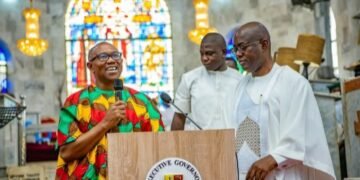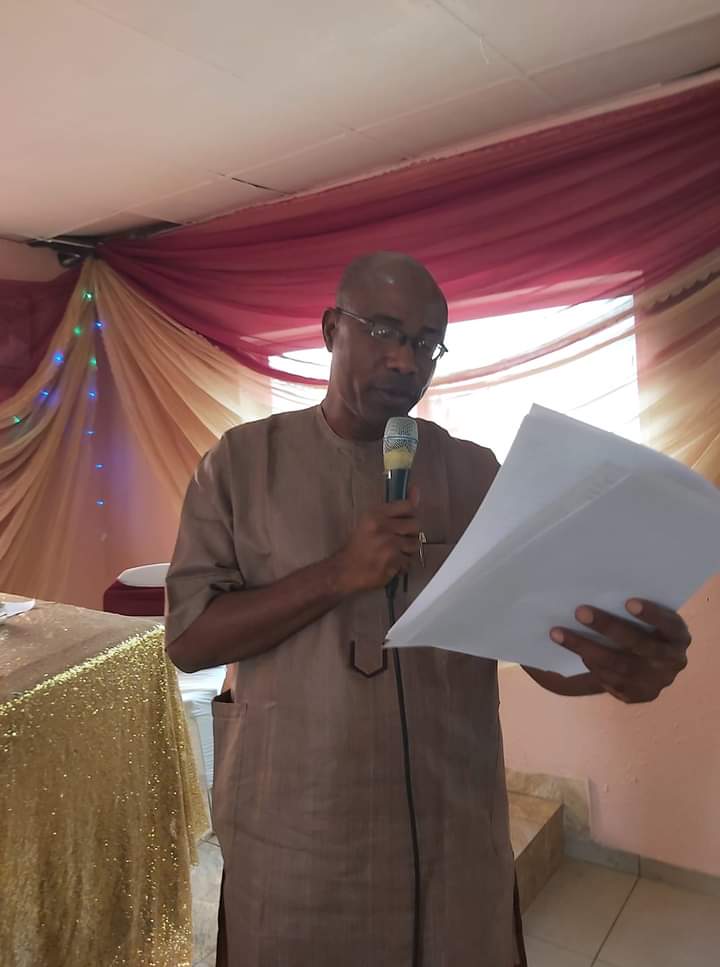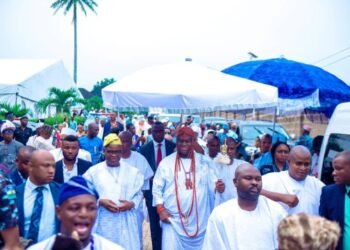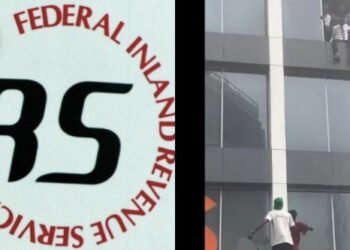‘Ayinde Barrister: In The Eye Of The Storm’
For a topic as this, the opening track of an elpee, which the iconic musician, being remembered here today, the late Dr. Sikiru Ayinde Barrister, titled ‘Suru Baba Iwa’ and released in 1981, is the most suitable for clarity. In the track, Barrister sings: Eni lori lori n fo o, Eni lori, lori n fo, translated loosely that the bigger the head, the bigger the headache. As fans and followers of his music, you would agree with me that Barrister’s literally big head played host to a handful of headaches, which almost distracted and nearly cost him his career.
But I think, all those traumatic episodes were part of life experiences, which a person of his status- an acclaimed pioneer of a new brand of indigenous music-should have expected for the genre to survive in conformity with a popular maxim that “uneasy lies the head that wears a crown”.
This age-old phrase is credited to the literature legend, Williams Shakespeare in his 1597 play titled King Henry IV. In that piece, the king agonized that his supposedly enviable position of privilege and power robbed him moments of his peace.
Besides, of all messengers of God, Barrister found Prophet Muhammed the most appealing. That certainly informed his consistent prayers to God to bless him with Muhammed’s fame. Interestingly, God seems to have answered his prayers as we can see in this 11th anniversary organized from your individual commitment to propagation of values for which Barrister lived.
One can, thus, say that God completed Barrister’s prayers by compelling him to pass through some discomforts which the holy prophet experienced before he passed away in 632 AD. For instance, Muhammed faced persecution in Mecca, his place of birth, and fled to an accommodating Medina in what is known as Hijrah. After he had settled in Medina, he fought Battle of Badr in 624 AD against the Meccan Quraysh who were hell-bent to exterminate him from the surface of the earth. It was a defensive but large-scale war which overstretched Muhammed’s force.
Barrister might not have been chased out of Nigeria. But record is clear on number of psychological warfares he confronted in the course of his career. These engagements are actually the meat of this lecture.
The Man, The Storm
This paper is not going to break any news about Barrister, it is rather going to refresh our memories and complement series of narratives which he had shared with us in his various compositions. An important feature in his music career was his regular reference to factual details of his life and times. However, I want you, dear listeners, to permit me to start my submission on this topic from where Barrister ended his terrestrial journey here on December 16, 2010.
Wasn’t it a surprise that a fiery controversy escorted him onto the bed of his grave? This is a question which readily came to my mind while I was examining this topic some days ago. There is no doubting the fact that everyone will answer the question in affirmative based on the available evidence.
Of course, there was no issue regarding his passage on that Thursday morning. No sooner had the news broken by the America’s Cable News Network (CNN), than it spread to every part of the globe like a wild fire. Barrister’s long absence from Nigeria and stage of performances, removed doubt from the news.
But 24 hours after he had breathed his last in the St. Mary’s Hospital in Paddington, London, expectations were sky-bound that his remains would be brought home for immediate burial in accordance with Islamic tradition. Public was looking forward to that auspicious moment when the body would arrive the Murtala Muhammed International Airport, Ikeja and finally his Fuji Chamber, Isolo residence, a house which he commissioned in 1981.
However, that wasn’t to be, a situation which set the ball rolling for what later looked like an unending wait until the last day of the year, December 31, 2010. It must be emphasized that before the body was brought home on that day, public had been disenchanted due to their previous disappointments from failed promises. It was later realized that a bad weather and heavy snow, which made London-Lagos flights difficult, caused the chain of reschedules.
That no portion of Barrister’s compound had been dug up for his resting place also gave credence to a suspicion that he might have been interred in the UK. But when the corpse arrived and was buried in his palatial living room at night, public again went to town with claim that the arrangement was dictated by a secret group to which Barrister allegedly belonged.
Having perhaps been worried about that allegation, a protégé of Barrister, Mayegun K1, would clear the air on the matter in an interview published by an entertainment magazine, Encomium, on January 3, 2016.
He said: “We all understand the fact that the man died abroad and we all know of the procedures to bring in the corpse from outside the country. It is the same process you pass through when you’re bringing in goods. The same thing applies when you are taking goods or a corpse outside your country. You pass through security operatives and you must be able to convince the authority on what exactly you’re bringing into the country.
“We thank God that we were duly honoured regardless of the fact that we had to bring the body back from abroad and we all know that he was a practicing Muslim. According to Islamic injunctions, you don’t delay burial when confirmation had been made of a dead one, but unfortunately, the burial was delayed because he died abroad.”
K1 shed more light on it thus: “We brought him into the country and he was honourably laid before his family and everybody present. I am sure the children were fully convinced it was their father that was buried and the wives too were also convinced.
“We gave the man a befitting burial in the midst of his family. The alfas prayed for the body and people had the opportunity to see it. Many people may not have seen the body because the crowd was just too huge.”
Thirty years before that incident, Barrister faced what I should call a near humiliation over the untimely death of the late popular Apala singer, Alhaji Ayinla Omowura precisely on May 7, 1980. On September 30, 1980, an Ogun State High Court ruled and passed death sentence on one Bayewumi after investigations had uncovered that he killed Omowura at a beer parlour at Ago’ka area of Abeokuta, the Ogun State capital.
According to Dr. Festus Adedayo in his book, “Ayinla Omowura: Life And Times Of An Apala Legend”, published at the 40th anniversary of Omowura in 2020, evidence in court presented by Dr. Majekodunmi, who was said to have performed a post-mortem examination on the body of Ayinla Omowura, revealed that the jug smashed on his head and the injury sustained there from had “caused a comminuted depressed fracture of about 2 insx11% ins, in the left temporal region which was associated with a large intracranial hemorrhage of the brain.
Adedayo wrote: “Ayinla’s body was identified to Dr. Majekodunmi by Adisa Soderu, the late musician’s cousin and thereafter, Majekodunmi certified the cause of Omowura’s death to be due to cerebral shock.”
But despite this glaring evidential proof to the contrary, a section of Omowura’s fans went after Barrister and accused him of being the brain behind Omowura’s misfortune. Their argument was fueled by the celebrated rift between Omowura and Barrister as evident in verbal exchanges which they traded in their respective elpees a year to the death of Omowura. The embittered fans must have reckoned that Barrister used what is called African remote control to lead Bayewumi into that murder act.
Barrister’s record, Aiye, in which he paid tribute to Omowura and also washed his hands off the incident, failed to pacify the fans, who were alleged to have imposed sanction on his appearance in Abeokuta and its environs. Intervention of some notable fans of Barrister, who were respected in the state capital, however, saved the situation and had the ban relaxed. Surprisingly, 41 years after, especially on social media, the Omowura-Barrister feud still generates mixed reactions among fans of both sides.
Five years after the episode, Barrister was again at the centre of another controversy; he was alleged to have forged a honourary doctorate degree from an American university. The rumour dominated the social arena where he was being derided and called names such as an overly ambitious musician who was too desperate for an international recognition.
His discretion, which guided his choice of picture on the jacket of the elpee, Fertilizer, released few months after the conferment of the honour, doused the uproar. Aside that, he wore his academic gown and also used other pictures taken at the ceremony, a track in the elpee is dedicated to the award and to his fans who accompanied him to that ceremony. The album was released in December 1985 and won a popular acceptance with its dance-able beats.
Some months after that dust had settled, Barrister was back in yet another public issue. Sometime in March 1986, a strange woman walked to his residence in Isolo and claimed she was his biological mother. Some newspapers feasted on that news but Barrister again survived that which was obviously a set up aimed at his rising profile.
Three years after, fans were treated to a track which Barrister composed in pidgin-Dem no catch me for London na lie dem dey talk, Iro nla. An appreciable number of fans loved this opening track of the ‘Fuji Garbage III’, which he released in December 1989. But not many fans know details of what actually transpired to have led Barrister to that composition.
A media report stated that the British Immigration operatives had earlier embarrassed Barrister on his arrival in the UK for his Summer 89 musical tour. The report alleged that Barrister was comprehensively searched to his underwear on a tip off that he was coming to the Queen’s land with a banned substance. He would be let off the hook when no evidence was found in support of the allegation. Those who were privy to that encounter obviously leaked it to Nigeria where it was treated as exclusive news for anxious public.
In 2007 or thereabout, fuji musicians had their unity tested, and only God intervention saved them of an impending conflagration. A famous fuji act, Dr. Saidi Osupa’s sensational emergence as King of Music spattered some diatribes at Barrister because of his direct involvement in the matter.
At a show, featuring him alongside Osupa and another fuji musician, Muri Thunder, Barrister sang and told the audience that henceforth, they should not call Osupa alone but King Osupa. And coming on the heels of the prevalent disquiet among fuji musicians, Osupa took a full advantage of Barrister’s seemingly harmless recommendation and went to town with lyrics asserting himself over his opponents.
Before Barrister could wake up to realize the weight of his declaration, his name was already dragged into the mud. A collaborative concert was staged by a select group of fuji musicians who publicly queried Barrister’s authority to place Osupa over those considered to be his seniors.
Again, before Barrister could realize the danger inherent in his endorsement, he was already before a large audience at a show in Ibadan where he was asked to put a mock crown on Osupa to further concretize his Lagos declaration. The fallout of that Ibadan show was a more charged atmosphere among fuji musicians, then throwing missiles at one another.
In my latest book, titled ‘My Journey with Barry Wonder’, I revisited that incident and described it as one of Barrister’s low moments of his career. But because he was a special one whom God anointed, he successfully weathered the storm and came out of it unscathed; responsibility to achieve the final reconciliation of all warring sides still rested on him.
He led Alhaji Ayinla Kollington and K1 to the auditorium of Lagos Television, Alausa, Ikeja, where fuji musicians from South-west and Kwara State converged and embraced a new peace. The passing on of Alhaji Kollington’s mother, Alhaja Fodeke Ilori, finally buried the discord as fuji musicians attended in a large number and performed at a carnival-like show which shared semblance with the eighth day fidau for Barrister’s mother, Alhaji Sifau Balogun, incidentally at the same LTV 8 venue in November 2001.
Even before he rose to become a music star, Barrister had tasted a certain trauma, which nearly pushed him into his early grave. Fortunately, he was spared to live to tell his story, which we are happily retelling today.
In his book, ‘My Memoir’, published in 2016, the respected Media Consultant to Barrister, Elder Dayo Odeyemi, made a screaming revelation on how luck saved Barrister from the jaw of death during the ill-fated Nigeria’s civil war which raged between the federal army and those of Biafra from May 1967 to January 1970.
Barrister’s ankle, Odeyemi recalled, had been hit by bullets from the opposing side at Abagana. Under a severe pain, he struggled to escape the death zone, and arrived Awka where he joined his troop. While he was expecting sympathy, he, however, was arrested alongside 64 others and detained for alleged attempt to desert the battlefront. Barrister faced capital punishment as contained in military law.
Odeyemi wrote: “The ‘deserters’ were marched to a small security room where they were chained hands and legs. Sikiru’s hands were chained from the back so he had to lie on his back for seven days. Mother luck, however, smiled on him as military intelligence later proved that he was not a war deserter but could not advance with his troop due to the injury he sustained on his ankle. The others were not that lucky as they were summarily executed in his presence…The mutiny charge was the second time Sikiru Ayinde escaped from the claws of death by providence.”
Conclusion
The last reference, I mean, his ordeal in the military is indicative that Barrister was a man of destiny, a star from childhood when he was riding on shoulders of the elders to sing during Ajiwere’Ajisari era in Mushin axis of Lagos. In this clime, where traditional beliefs and practices still subsist, despite a heavy presence of Islam and Christianity, it is not often such a kid will take stardom to adulthood. How many of our footballers whose stars shone at age grade tournament made it to the peak of their career? How many of those kids fuji musicians we saw between 2000 and 2002 survived today?
That is why I am not surprised reading about potholes planted on Barrister’s road till he called it quit. I think, everything about his travails bothers on the Shakespeare’s words that ‘uneasy lies on head that wears a crown’. And if asked to encapsulate those experiences, the likelihood is that Barrister would excerpt a line from his elpee, titled ‘Adieu Abiola’, in 1998. He would smile as usual and sing:
enigbon
bi Olohun o si o,
omugo
lomo eda o eee.
•Being a paper presented by Chief Tunde Busari on the occasion of the 11th anniversary and End-of-the-Year get-together by Mr Fuji Fans, held on 18 December, 2021 at Yaba Local Council Development Authority (LCDA), Panti Street Yaba, Lagos.





























